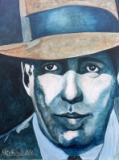Boxers
Boxing great Henry Armstrong hammered away at discrimination in the 1930s and 1940s by refusing to fight in segregated arenas.

Satchel Paige was the greatest baseball pitcher of the Negro Leagues and quite possibly the greatest pitcher ever. He became the oldest rookie ever in the major-leagues when he joined the Cleveland Indians in 1948 at age 42. They went on to win both the pennant and the World Series. Major League Baseball made Satchel Paige a legend in his own lifetime. Elected to the Baseball Hall of Fame in 1971, Satchel Paige was the first player to be inducted from the Negro leagues.
Born Leroy Robert Page to John Page, a gardener, and Lula Page, a domestic worker, in a section of Mobile, Alabama, known as Down the Bay, Lula and her children changed the spelling of their name from Page to Paige in the mid-1920s, shortly after his father passed away. Lula said, "Page looked too much like a page in a book," whereas Satchel explained, "My folks started out by spelling their name 'Page' and later stuck in the 'i' to make themselves sound more high-tone."
Leroy Robert Page was born in Mobile, Alabama. His birthdate has often been reported with varying ages and birthdates, ranging from 1900 to 1908. Paige himself, along with his mother was often the source of many of these dates and the true date was difficult to verify since there were no hospital records for African American births in the Jim Crow era of the South. Paige claims his family tree with important dates were all recorded in his mother's bible. Paige wrote in his autobiography, "Seems like Mom's Bible would know, but she ain't ever shown me the Bible". Later, when documenting his autobiography, Cleveland Indians owner Bill Veeck traveled to Mobile, Alabama and accompanied Paige's family to the County Health Department to obtain his birth certificate, which stated his birthday was July 7, 1906.
One of 12 children, Leroy would carry satchels for railroad passengers, hence the nickname Satchel, which would he would go by for the rest of his life. Following several run ins with the law for truancy, and other petty crimes, Satchel Paige was arrested for shoplifting two weeks before his twelfth birthday. He was sentenced to the Industrial School for Negro Children in Mount Meigs, Alabama, the state reform school, until his eighteenth birthday. It was at Reform School, that Satchel Paige learned baseball and developed his pitching skills. Under the guidance of Edward Byrd, Paige learned to kick his front foot high and to swing his arm around so it looked like his hand was in the batter's face when he released the ball.
After his release from reform school, Paige played for several Mobile semi-pro teams. He joined the semi-pro Mobile Tigers where his brother Wilson was already pitching. He also pitched for a semi-pro team named the Down the Bay Boys, and he recalled that he once got into a jam in the ninth inning of a 1–0 ballgame when his teammates made three consecutive errors, loading the bases for the other team with two outs. Angry, Paige said he stomped around the mound, kicking up dirt. The fans started booing him, so he decided that “somebody was going to have to be showed up for that.” He called in his outfielders and had them sit down in the infield. With the fans and his own teammates howling, Paige struck out the final batter, winning the game.
Satchel Paige worked his way into the Negro Leagues, with the right hander pitching for the legendary Kansas City Monarchs and Pittsburgh Crawfords. Like many African American ballplayers of the time, Satchel Paige spent his winters playing on the diamond in Puerto Rico, Cuba, Mexico and the Dominican Republic. Often pitching year-round and jumping from team to team, Paige would frequently go to a new club for more money. He would even show up to pitch for other teams on his days off for a cut of the gate..
Had Satchel Paige been white, we would see his name repeated in the record books for his feats on the baseball diamond. Instead we only have hearsay and unreliable stats to mark his greatness. Joe DiMaggio called Satchel Paige "the best and fastest pitcher I've ever faced". It was said that Satchel Paige pitched over 100 miles per hour. He also claimed that in 1934, he won 104 out of 105 games and at one point that year pitched 29 days in a row. He is rumored to have pitched 62 consecutive scoreless innings at one point, and also struck out 22 batters in a barnstorming game. Satchel Paige spent 22 years playing baseball in the Semi-Pros, Negro League and winter leagues in the Caribbean dreaming of a chance to play in the the Major Leagues.
Satchel Paige reached his ultimate goal and became the first African American pitcher in the American League when Bill Veeck signed him to the Cleveland Indians in 1948, just one year after Jackie Robinson broke the color barrier. Paige signed his major league contract, for $40,000 for the three months remaining in the season, becoming the seventh Negro big leaguer overall. At 42 years, Paige was the oldest rookie to ever debut in baseball. Many thought Veeck was pulling a stunt, but he defended Paige, saying he should have been pitching in the Majors long ago. Record crowds came out to see him, and for good reason. Satchel won 6 games against just 1 loss that year, with an earned run average of 2.48, and pitched in one game of the World Series, with the Indians defeating the Boston Braves.
1949 was not nearly as good for Paige as 1948. He ended the season with a 4–7 record and was 1–3 in his starts with a 3.04 ERA. After the season, with Veeck selling the team to pay for his divorce, the Indians gave Paige his unconditional release.
Paige, penniless, returned to his barnstorming days after being released from the Indians. In 1950, he signed with the Philadelphia Stars in the Eastern Division of the Negro American League for $800 per game.
When Veeck bought an 80% interest in the St. Louis Browns, the first thing he did was sign Paige. In his first game back in the major leagues, on July 18, 1951, against the Washington Senators, Paige pitched six innings of shutout baseball, but was roughed up in the seventh, giving up three runs. He ended the season with a 3–4 record and a 4.79 ERA.
In 1952, Rogers Hornsby, an alleged former member of the Ku Klux Klan, took over as manager of the Browns. Despite past accusations of racism, Hornsby was less hesitant to use Paige than Boudreau was four years before. Paige was so effective that when Hornsby was fired by Veeck, his successor Marty Marion seemed not to want to risk going more than three games without using Paige in some form. By July 4, with Paige having worked in 25 games, Casey Stengel named him to the American League All-Star team, making him the first black pitcher on an AL All-Star team. Sadly, the All-Star game was cut short after five innings due to rain and Paige never got in.
Playing off and on in the Major Leagues, the barnstorming teams, and the Negro Leagues Satchel Paige played on the baseball wherever he could find a game during the next decade. In 1965, as the oldest man to have ever played a major league game, Satchel Paige was signed by the Kansas City Athletics, and the 59 year old right hander threw three innings in a game. Whether it was a publicity stunt or an attempt to get Paige enough innings to qualify for his pension, he sat in a rocking chair in the bullpen, recording one strikeout and allowing one hit. He finished his big league career with 28 wins, 31 losses and 32 saves, with a 3.29 earned run average and 288 strikeouts in 179 games. Satchel Paige never once committed an error, and was twice an All-Star with the Browns.
Satchel Paige's pitching was amazing and his showboating was legendary and his baseball career spanned five decades. Pronounced the greatest pitcher in the history of the Negro Leagues, Satchel Paige was inducted into the Baseball Hall of Fame in 1971.
Don't miss a single page. Find everything you need on our complete sitemap directory.
Listen or read the top speeches from African Americans. Read more
Read about the great African Americans who fought in wars. Read more
African Americans invented many of the things we use today. Read more
Thin jazz, think art, think of great actors and find them here. Read more
Follow the history of Black Americans from slave ships to the presidency. Read more
Olympic winners, MVPS of every sport, and people who broke the color barrier. Read more
These men and women risked and sometimes lost their life to fight for the cause. Read more
Meet the people who worked to change the system from the inside. Read more

Visit my RedBubble page and use Michael Arnold Art to create greeting cards, T-shirts, mugs, and more.

The variety and impressive numbers of mammals, birds and marine wildlife in Alaska draw visitors from all over the world. For some travelers, Alaska is wilderness, at least compared to what they may know from back home. The pristine wilderness of Alaska is, perhaps, the last vestige of thriving populations of North American wildlife. Where else can you see polar bears, bald eagles, blue and humpbacked whales, gray wolves, grizzly bears, orcas, lynx, moose, and hundreds of other rare and endangered species in their original and undisturbed natural habitats?

Enjoy our website filled with original signed acrylic paintings by award winning Artist Michael Arnold. Located in Citrus County Florida, Michael Arnold is a the editor at the Citrus County Chronicle. When he's not busy being an editor, he is an avid artist who enjoys painting in a variety of styles. We hope you take the time to click on each image to see a larger view and to learn what the artist, Michael Arnold has to say about his paintings.

As dog owners and people who care deeply for animals and wildlife, we wanted our Dog Encyclopedia to be a website that could empower pet owners to create the most positive, loving environment for their dogs. Dog Encyclopedia realizes that owning a dog is like adding a new member to your family.

Floridian Nature has everything your are looking for in Florida nature. The wildlife of Florida is rich and varied, yet most of us are familiar with only a dozen or so species: the "well known endangered species such as manatees and panthers; those, like raccoons and squirrels, that have adapted to urban environments; the frightening alligators and black bears; and those like the armadillo who can't seem to cross the road. Yet they are just a few of the many animal species found in Florida.
